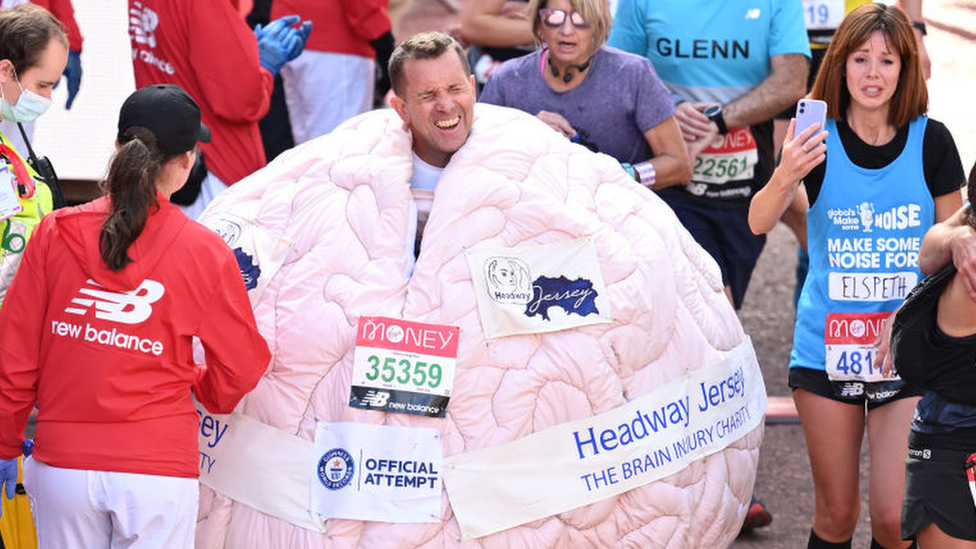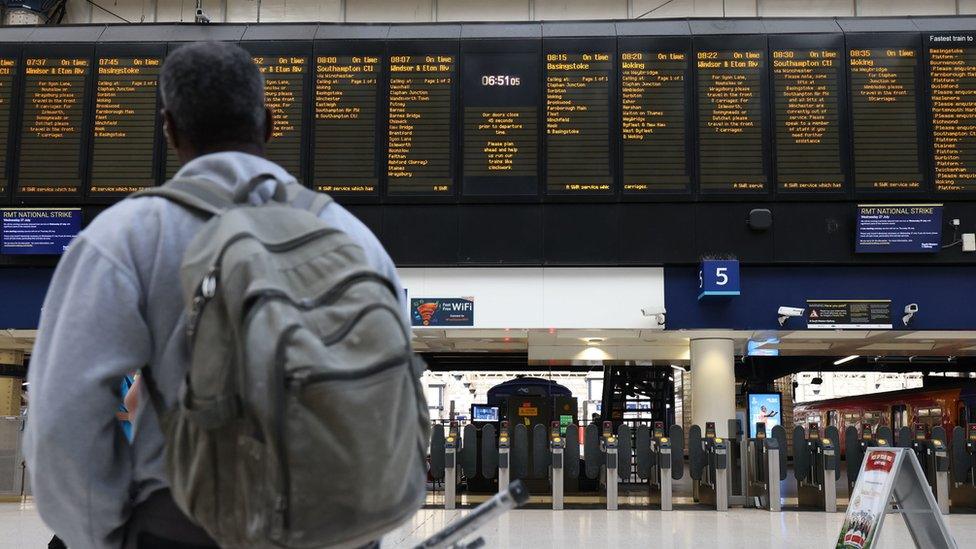Train strikes could impact the London Marathon
- Published

Train drivers and railway workers are set to stage the largest strike to date as part of a long-running row over pay.
Members of the Aslef and RMT unions will walk out on 1 October in order to bring the rail network to an "effective standstill", union bosses said.
Just 10% of services are likely to run on Saturday, with travel to and from the London Marathon as well as the Tory Party conference potentially affected.
Train drivers will then take a second day of industrial action on 5 October.
Aslef, which is the union for train drivers, has confirmed that 9,000 drivers at 12 train companies across the country will walk out on both 1 and 5 October.
Meanwhile the RMT, which represents rail workers including guards and signalling staff, said it has given notice to Network Rail, which maintains the country's railways, as well as to 14 train companies that its 40,000 members will strike on 1 October.
The Rail Delivery Group, the industry body representing train operators, claimed that "thousands" of runners taking part in the London Marathon could have their journeys disrupted.
The race is on 2 October which is not a strike day but services could be disrupted following industrial action because trains are not in the correct locations.
Many participants may also travel ahead of the event.
"These strikes will once again hugely inconvenience the very passengers the industry needs to support its recovery from the ongoing impact of the pandemic," said the Rail Delivery Group.
The Conservative Party conference in Birmingham, from 2 October to 5 October, is also expected to be hit by disruption and cancelled services.

The latest strike action comes after a series of large-scale walk outs in recent months as unions seek pay increases in line with the rising cost of living.
Rail bosses claim they want to give workers pay rises but they and the government insist changes are needed to "modernise" the railway, to end some working practices and to save money.
The RMT said its decision to hold further strikes was due to "no further offers from the rail industry to help come to a negotiated settlement".
Mick Lynch, the union's general secretary, said the large-scale action would send a "clear message to the government and employers that working people will not accept continued attacks on pay and working conditions at a time when big business profits are at an all-time high".
"We want a settlement to these disputes where our members and their families can get a square deal. And we will not rest until we get a satisfactory outcome," he added
Train drivers' union Aslef, gave notice of the latest strike to the train companies on Friday, but did not make a a public announcement at the time now "as a mark of respect for the monarch".
A strike had been planned for 15 September, but was postponed following the announcement of the Queen's death
The union said it had successfully negotiated pay deals with nine train companies this year, but remained in dispute with some firms which it claimed hadn't offered any deal and where drivers hadn't had a pay increase since 2019.
"We would much rather not be in this position. We don't want to go on strike - withdrawing your labour, although a fundamental human right, is always a last resort for this trade union - but the train companies have been determined to force our hand, said Mick Whelan, Aslef's general secretary.
The BBC understands members of the TSSA union are also expected to strike on 1 October, but this has not been officially confirmed.
In separate disputes, Arriva Rail London members, Hull Trains and bus workers at First Group Southwest will also take strike action on October 1st.


It's likely that about 10% of usual Saturday services will be able to run on 1 October. For the first time in the ongoing wave of strike action, both Aslef and the RMT will strike on the same day, meaning the number of trains running could be half of previous RMT strikes.
The rail industry will now be putting together their contingency plans, with more detail expected at the end of the week.
What gives the RMT strikes such nation-wide impact is the involvement of Network Rail signallers, which means a fraction of usual trains can run even in areas where train companies are not directly involved in strike action. When Aslef's train drivers get involved, few or no trains at all can run on affected train operators' routes.
If the strikes go ahead, these will also be the first train strikes since Anne-Marie Trevelyan replaced Grant Shapps as Transport Secretary.
She has already invited the general secretaries of Aslef, RMT and TSSA for meetings. This signals a desire to be seen to take a less adversarial approach than her predecessor. However, it doesn't mean the substance of the government's position has changed.


How will you be affected by the rail strikes? Share your experiences by emailing haveyoursay@bbc.co.uk, external.
Please include a contact number if you are willing to speak to a BBC journalist. You can also get in touch in the following ways:
WhatsApp: +44 7756 165803
Tweet: @BBC_HaveYourSay, external
Please read our terms & conditions and privacy policy
If you are reading this page and can't see the form you will need to visit the mobile version of the BBC website to submit your question or comment or you can email us at HaveYourSay@bbc.co.uk, external. Please include your name, age and location with any submission.
Related topics
- Published16 September 2022
